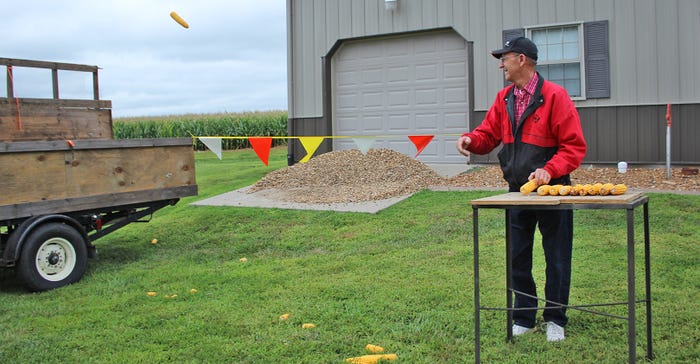
Bang. Bang. Bang. It is the sound every competitor in a corn shucking contest wants to hear. The moment an ear of corn rebounds off a vintage corn wagon bump board, known as "bang boards" — right before it drops into the wagon. It is a noise Nelson Weber recalls hearing stories about as a child growing up across the road from the National Corn Shucking Contest site in 1937.
"The first meal in our house was served in the front room to 20 of the corn shucking contestants," he says. Nelson was just a year old when crowds converged on Weber Brothers Farm, north of Marshall, Mo. History books would point to more than 120,000 people in attendance and some 30,000 cars for the two-day event.
The farm, first owned by Jake, George and Adolph Weber, hosted the competition 80 years ago. This year, descendants of the Weber family gathered for a family reunion to look back at the legacy of the brothers and pay homage to their involvement in the National Corn Shucking Contest. Grandchildren, great-grandchildren and even great-great-grandchildren gathered at the family farm still owned by Nelson, the grandson of Jake.
While the family grew too large for the living room that once housed corn shuckers from across the country, family members ate on the front lawn in perfect view of the fields, where thousands of people once cheered on their favorite competitor. In 1924, 10 states in the Corn Belt formed a corn picking ring to promote the national event. Today, there are nine states that are members of the National Cornhusking Association — Iowa, Indiana, Ohio, Minnesota, Kansas, Missouri, Illinois, South Dakota and Nebraska.
Dubbed the "greatest rural sporting events of the times" by writer J.C. Patterson, the contest is headed back to Saline County, Mo. The competition will be Oct. 21 at the Saline County Fairgrounds in Marshall, Mo. There are 10 classes that are from 10 to 30 minutes long that people can participate in, according to Lawrence Deal, National Corn Husking Association president. "We are proud to have the 80th anniversary back in Missouri," he says. Deal anticipates up to 125 pickers this year.
Early husking memories
Richard Clemens is one of the family's history-keepers. He is the grandson of George Weber. At this year's family reunion, he brought out history books and photos detailing the corn husking competition.
Weber Brothers Farm provided 45 acres of corn for the contest field and another 300 acres for free parking. There was also space for a midway full of farm equipment, concessions and entertainment — like a mule show.
At noon on Nov. 4, 1937, a starting bomb was fired by then-Secretary of Agriculture Henry A. Wallace, who pressed the telegraph key in Washington, D.C., and a local judge in Marshall fired a gun on the grounds at the same moment to start the event.
"It rained that day," Nelson says. "It was a mess." He recalls stories of cars stuck and abandoned in fields. Still, he says, the people came — not all of them for the husking.
Pickpockets ran rampant. "My dad collected boxes full of wallets and purses," he says. "He would find them after the money and valuables were taken, just dumped on the ground behind the barn." The family even hired guards for every building on the farm "to keep people out."
Future of the farm
Cornstalks once again stand tall in the field. However, there will be no competitors in the field — only combines. The Weber family still farms the land, raising corn and soybeans. It is a family tradition. One Nelson is proud to carry on.
Today, Nelson farms alongside his son, Chris. Up the road is the headquarters of Weber Seeds, owned by Dan Weber, grandson of George Weber.
"You always want to pass on the land to the next generation," Nelson says. "The Bible tells us that we are to leave an inheritance to our children and our children's children. That is what our grandfathers did. They made sure that this farm would be here for all the descendants of the Weber family."
As family members took turns throwing corncobs at a stationary wagon, complete with bang board, they were reminded of a lost era in agriculture. "It is not as easy as it looks," Chris says. "It is fun to recreate this event. Corn husking is something that the Weber family will always be associated with. It a part of our history. A part of Missouri history."
About the Author(s)
You May Also Like






